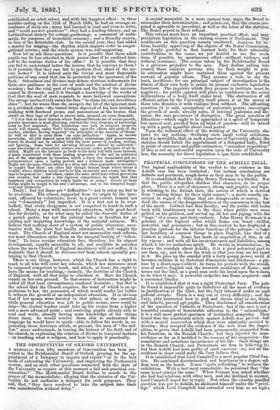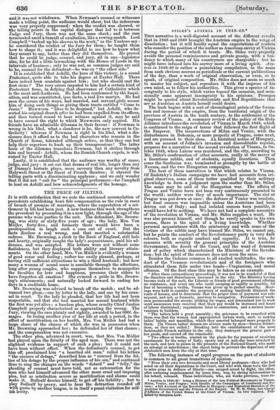PRACTICAL CONCLUSIONS OF THE ALLULLI TRIAL. THE logical applicability of
the verdict to the evidence in the Achilli case has been contested ; but certain conclusions are definite and pertinent, rough-hewn as they may be by the public.
It is established that Dr. John Henry Newman is a libeller. Not that the public altogether dislikes that character, in itsroper place. There is a sort of eloquence, strong and graphic, andp high- ly relishing to the British taste, the savour of which is derived from " calling things by their right names,"—a merit usually ex- ercised in regard to things that are disagreeable or coarse. In- deed, the excess of the disagreeableness or the coarseness is the test of the merit. Cobbett had that faculty, and the public still looks back with traditionary zest to the days when public men were grilled on his gridiron, and served up, all hot and piping, with the " hogo " of a coarse and lusty cookery. John Henry Newman is a polemic of the highest order which Rome can boast—skilful, powerful, and persuasive; but in this contest he has displayed a peculiar aptitude for the inferior functions of the polemic—a fami- liar handling of common things in plain English, like that of a Cobbett in orders. Rome has made an acquisition of him, in all his vigour ; and with all his inconveniences and liabilities, among which is his too audacious spirit. He revels in denunciation ; he knows the scandals about Achilli; it is a good polemical part to use them up ; and he does the work so that you may see his heart in it. He piles up the scandal with a forty-gossip power, until it becomes sublime in its diabolical dimensions and blackness—a pic- ture by a Dantesque Cobbett: he turns his periods with the sturdi- ness of native English and the inerrable confidence of Rome ; and tosses out the libel, as a good man casts his bread upon the waters, to do what it may. A powerful cudgeller has Rome acquired—and a convicted libeller.
It is established that it was a right Protestant jury. The pub- lic found it impossible quite to disbelieve all the mass of evidence injustification of the libel; but the Jury laboured under no such judicial scruple. There is a way out of every difficulty ; and the Jury, ably instructed how to pick and choose what to see, think, and believe, proved apt pupils. They disclaimed all consideration of the question of Catholic or Protestant ; but if the case is not a beautiful example of honourable adhesion to the " subauditam," it is a still more perfect specimen of instinctive sympathy. They found that the nineteenth article against Achilli was proved—but with a mental reservation which they were admirably assisted to develop : they accepted the evidence of the note from the Inqui- sition, to prove that Aehilli had been permanently suspended from Iris functions in the Romish Church ; but they rejected the same evidence so far as it testified to the reasons of his suspension—the scandalous and notorious incontinence of his life. Such things are in the Romish Church, and Protestants are firm in believing it; but that Achilli had been guilty of such excesses—no, not all the evidence in court could make the Jury believe that. It is established that Lord Campbell is a most popular Chief jus- tice. He combined discrimination and heartiness in a degree sel- dom seen on the bench. It was " quite refreshing " to witness the exhibition. With a tact most remarkable, he perceived that "the same is not always the same." When Forman was asked whether she had had relations with other men, and she declined to answer, Lord Campbell urged her to reply. But when the exactly parallel question was put to Achilli, he sheltered himself under the " privi- lege " which Lord Campbell had extended over him as an aegis;
and it was not withdrawn. When Newman's counsel or witnesses made a telling point, the audience would cheer, but the indecorum was very properly suppressed : when the verdict was cheered, or the telling points in the capital dialogue that led to it between Judge and Jury, there was not the same check ; and the case terminated amid a tumult of exultation, like a rowing-match. Lord Campbell "tucked up his sleeves to the work," as the Yankees say : he considered the verdict of the Jury for them; he taught them how to shape it; and it was delightful to see how he knew what they meant to say, better than they did themselves. He proved that he could be judge, counsel, and jury, all in one—legislator also, for he did a little lawmaking with the House of Lords in the intervals of business ; only he was not, as commonjudges are said to be, counsel for the defendant—he was on "the other side."
It is established that Achilli, the hero of this victory, is a sound Protestant, quite able to take his degree at Exeter Hall. There have indeed been scandals against him ; but who should cast the first stone ? The very errors imputed to him had a certain kind of Protestant force, in defying that observance of Catholicity which is the most anti-Lutheran. He had been condemned by the Inqui- sition, and was constituted, ipso facto, a real live martyr. He had seen the errors of his ways, had married, and servant-girls accuse him of doing such things as giving them tracts entitled " Come to Jesus." Mawworm "likes to be despised," but Achilli, who de- serted his original church after he had been expelled from its offices, and then turned round to bear witness against it, may be said to have earned the right to which Mawworm only aspired. His friends have an admirable dilemma in their favour : if ewman is wrong in his libel, what a slanderer is he, the new convert to Ca- tholicity ! whereas if Newman is right in his libel, what a dis- closure does it afford as to the bad characters who remain in the Church of Rome, tolerated although active, so that they can but help their superiors to hush up their transgressions ! The latter horn of the dilemma transfixes Newman, but it strikes through him and beyond : Achilli, whom the Romish Church expels, is wel- comed by Exeter Hall.
Lastly, it is established that the audience was worthy of cause,
3 , and jury : it sat out that drama of real life, longer than any of umas's historic plays, more savoury than any novelty from Holywell Street or the freest of French theatres ; it cheered the telling parts with a discriminating applause ; and we only wonder that it did not " call for " the principal performers—for Campbell to lead on Achilli and bow acknowledgments of the homage.



























 Previous page
Previous page